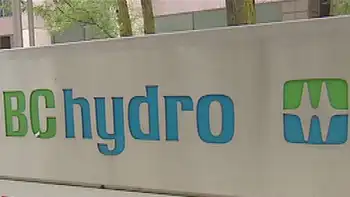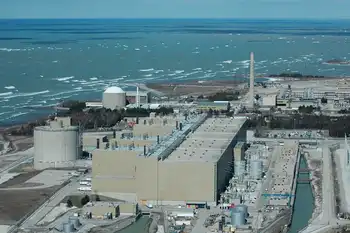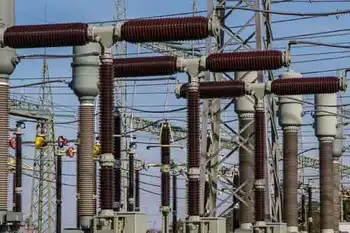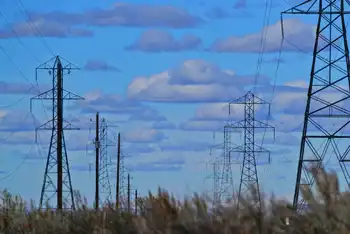CEA Recommends Solution to Current Problems
OTTAWA -- - In a paper released today, the Canadian Electricity Association (CEA) recommends measures to help restore confidence in the North American electricity industry. These measures would help to solidify the integrated North American electricity market by enhancing cross-border trade, increasing system and market efficiencies, and improving environmental performance. CEA President Hans Konow stated that “in the face of current international events, due to the close and long-standing working relationship of Canada and the United States on energy issues, the greater cooperation that we call for in our paper is more timely than ever.”
“CEA is committed to working closely with our American colleagues on bilateral energy issues, building on achievements to date” Konow said. “We believe that in times of crisis such cooperation is all the more important for the benefit of both our countries.” A remarkable bi-lateral trading system has evolved between Canada and the United States over the last half century. What began with small tie-lines and the development of boundary waters for hydroelectricity, has evolved into extensive cooperative arrangements for managing transmission system reliability, major inter-ties across the Canada-U.S. border coast-to-coast, and growing exports and imports. The North American electricity industry – traditionally perceived as a model of stability in both Canada and the United States - is in a state of significant uncertainty. According to the CEA paper, there are three fundamental causes for the current situation: lack of clarity around market rules, environmental challenges, and the very poor investment climate. The evolving North American market is increasingly a regionally-integrated one. CEA believes that continued and growing regional integration will reduce uncertainty. While increased regional integration alone cannot solve all the challenges that are currently facing the industry, it can contribute to greater efficiency, increased reliability, more predictable regulation and policy, lower costs and greater environmental benefits overall, thereby increasing investor confidence and reducing uncertainty in the marketplace. Support for a self-governing international organization for developing and enforcing mandatory reliability standards for the evolving electricity industry Mr. Konow noted that while the industry may be experiencing significant challenges, “the North American electricity system is among the most reliable in the world and electricity consumers generally have access to energy at reasonable prices.” “Regionally integrated markets are a reality in the Canada-US electricity relationship,” Mr. Konow stated. “Recognizing the nature of these markets, and identifying opportunities to build on them, offers significant promise for future growth, for improved environmental performance, and for the continuing reliable supply of electricity to consumers across North America.” CEA was scheduled to release this paper at its annual Washington Forum, which was to be held on March 26, 2003. However, given the pre-occupation with current geo-political events, CEA has decided to postpone the conference until later in the year. Konow commented that “CEA looks forward to an early opportunity to address the common challenges of ensuring North American energy security once current events are successfully resolved.”
A remarkable bi-lateral trading system has evolved between Canada and the United States over the last half century. What began with small tie-lines and the development of boundary waters for hydroelectricity, has evolved into extensive cooperative arrangements for managing transmission system reliability, major inter-ties across the Canada-U.S. border coast-to-coast, and growing exports and imports.
The North American electricity industry – traditionally perceived as a model of stability in both Canada and the United States - is in a state of significant uncertainty. According to the CEA paper, there are three fundamental causes for the current situation: lack of clarity around market rules, environmental challenges, and the very poor investment climate.
The evolving North American market is increasingly a regionally-integrated one. CEA believes that continued and growing regional integration will reduce uncertainty. While increased regional integration alone cannot solve all the challenges that are currently facing the industry, it can contribute to greater efficiency, increased reliability, more predictable regulation and policy, lower costs and greater environmental benefits overall, thereby increasing investor confidence and reducing uncertainty in the marketplace.
Support for a self-governing international organization for developing and enforcing mandatory reliability standards for the evolving electricity industry
Mr. Konow noted that while the industry may be experiencing significant challenges, “the North American electricity system is among the most reliable in the world and electricity consumers generally have access to energy at reasonable prices.”
“Regionally integrated markets are a reality in the Canada-US electricity relationship,” Mr. Konow stated. “Recognizing the nature of these markets, and identifying opportunities to build on them, offers significant promise for future growth, for improved environmental performance, and for the continuing reliable supply of electricity to consumers across North America.”
CEA was scheduled to release this paper at its annual Washington Forum, which was to be held on March 26, 2003. However, given the pre-occupation with current geo-political events, CEA has decided to postpone the conference until later in the year. Konow commented that “CEA looks forward to an early opportunity to address the common challenges of ensuring North American energy security once current events are successfully resolved.”
Related News

BC Hydro rates going up 3 per cent
VANCOUVER - The B.C. Utilities Commission has rejected a request by the provincial government to freeze rates at BC Hydro for the coming year, meaning a pending rate increase of three percent will come into effect, April 1, 2018.
BC Hydro had asked for the three per cent increase, but, last year, Energy Minister Michelle Mungall directed the Crown corporation to resubmit its request in order to meet an NDP election promise.
"After years of escalating electricity costs, British Columbians deserve a break on their bills," she said at the time.
However, the utilities commission found there was "insufficient regulatory justification to approve…




